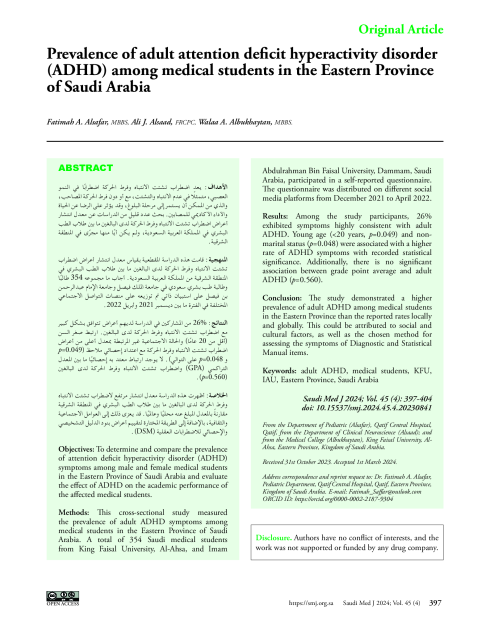Prevalence of adult attention deficit hyperactivity disorder (ADHD) among medical students in the Eastern Province of Saudi Arabia

- Fatimah A Alsafar
- Ali J Alsaad
- Walaa A Albukhaytan
Saudi Medical Journal
10.15537/smj.2024.45.4.20230841Abstract
Objectives: To determine and compare the prevalence of attention deficit hyperactivity disorder (ADHD) symptoms among male and female medical students in the Eastern Province of Saudi Arabia and evaluate the effect of ADHD on the academic performance of the affected medical students.
Methods: This cross-sectional study measured the prevalence of adult ADHD symptoms among medical students in the Eastern Province of Saudi Arabia. A total of 354 Saudi medical students from King Faisal University, Al-Ahsa, and Imam Abdulrahman Bin Faisal University, Dammam, Saudi Arabia, participated in a self-reported questionnaire. The questionnaire was distributed on different social media platforms from December 2021 to April 2022.
Results: Among the study participants, 26% exhibited symptoms highly consistent with adult ADHD. Young age (<20 years, p=0.049) and non-marital status (p=0.048) were associated with a higher rate of ADHD symptoms with recorded statistical significance. Additionally, there is no significant association between grade point average and adult ADHD (p=0.560).
Conclusion: The study demonstrated a higher prevalence of adult ADHD among medical students in the Eastern Province than the reported rates locally and globally. This could be attributed to social and cultural factors, as well as the chosen method for assessing the symptoms of Diagnostic and Statistical Manual items.
Keywords
adult ADHD, medical students, KFUIAU, Eastern Province, Saudi Arabia, prevalenceCitation
Alsafar, F.A., Alsaad, A.J., & Albukhaytan, W.A. (). Prevalence of adult attention deficit hyperactivity disorder (ADHD) among medical students in the Eastern Province of Saudi Arabia. Saudi Medical Journal, 45(4), 397-404, doi: 10.15537/smj.2024.45.4.20230841
Link to this page: https://res.adhd.org.sa/doi/10.15537/smj.2024.45.4.20230841